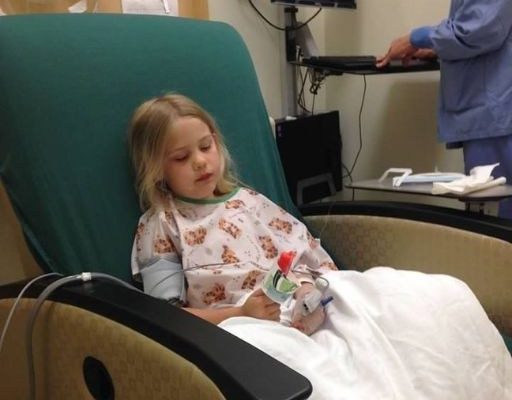Doctors warned us we might be living her final days. But my daughter wasn’t afraid. She didn’t beg for miracles or complain about pain. She just asked for simple joys—juice, laughter, a silly hospital gown covered in cartoon cats.
People like to say children don’t understand. But she did. She understood everything.
One afternoon, after the nurse left, she looked at me, IV taped to her small hand, and whispered:
“You don’t have to cry when I’m awake, okay?”
It was as if she was the one comforting me.
She never once asked about test results or treatments. Instead, she wanted to play Uno. She wanted her hair brushed “like before school.” She wanted pancakes in the morning, her brother’s yellow teddy bear from home, and the goofy cartoon about the clumsy talking dog.
I was falling apart while she was holding me together with smiles that didn’t belong to a child stuck in that bed.
One night, she tugged at my sleeve. “Mom, if I go… will you still laugh?”
I couldn’t answer. My throat closed, my heart breaking. But she answered for me: “You better. Otherwise, I’ll come back just to tickle you.”
That night I promised myself I would laugh—even if it shattered me inside.
Days blurred into weeks. The doctors kept repeating “any day now.” But “any day” kept turning into another sunrise. She defied their timelines the way she pushed away bland oatmeal and asked for juice instead. “Juice makes me strong,” she’d grin.
One afternoon she asked me to make a list with her. My heart sank, thinking she meant a bucket list. But no—she wanted a “happy list.” On the back of a cafeteria menu we wrote:
-
Uno with Mom
-
Brother’s teddy bear
-
Cartoons with talking dogs
-
Jokes from Dr. Singh
-
Pancakes with too much syrup
It wasn’t a list of someone preparing to leave. It was the list of someone refusing to stop living.
Her attitude transformed the whole floor. Nurses started sneaking in cat stickers. The cafeteria lady slipped her extra syrup. Even Dr. Singh, known as the most serious man alive, began showing up with knock-knock jokes scrawled on his palm. Her laughter echoed through sterile hallways, pulling smiles from patients and staff alike.
Then came the stormy night when the lights flickered and fear pressed down on me. But she wanted to build a fort. So we stacked blankets and pillows, crawled inside, and she told me a ghost story by flashlight—falling asleep mid-sentence. I stayed awake, staring at her chest rising and falling, terrified it might stop.
But morning came. And another. And another.
Eventually, a new doctor walked in, studied her chart, and said carefully: “I don’t want to give false hope, but… her numbers are improving.”
Improving. A word I hadn’t heard in months.
When I told her, she just smirked. “Told you juice makes me strong.”
Slowly, she went from barely sitting up to walking down the hallway. Still weak, but alive, stubbornly alive. The doctors warned us not to expect too much. But she didn’t listen.
One morning she pleaded, “Can I go outside? Just to feel the sun.” After endless paperwork, they wheeled her out with her IV stand trailing beside her. The sunlight hit her face, and she lifted her chin, glowing. “See, Mom? I’m not done yet.”
She wasn’t.
A month later, she walked out of the hospital. The neighbors threw her a welcome-home party. Balloons, cake, kids running wild—she laughed from the couch, finally back where she belonged.
Still, I carried fear every day. What if it returned? What if this miracle was temporary? I never said it out loud, but she saw it in my eyes. One evening, watching the sunset, she nudged me.
“Maybe I got sick so people would remember to be happy,” she said softly. “The nurses laughed more. Dr. Singh laughed more. Even you laughed more. Maybe that was the point.”
I wanted to argue she deserved happiness without pain—but her quiet acceptance humbled me.
Life slowly rebuilt. She returned to school part-time, joined the art club, painted bright yellow suns on every page. And then, months later, the hospital called. Inspired by her, they had started a new program: Laughter Rounds—doctors and nurses telling jokes, playing games, bringing joy to patients as part of their healing. They named it after her.
When I told her, she cried happy tears. “See, Mom? I did something.”
“You did everything,” I whispered.
Years have passed now. She still goes for check-ups, still drinks her juice every morning, and every time we drive past the hospital, she waves.
Looking back, I see it clearly: she wasn’t just fighting for herself. She was teaching us all. Teaching me that joy doesn’t wait for perfect moments—it grows in the hardest ones.
The doctors once said those days might be her last. But she turned them into beginnings.
And the lesson she left behind is simple: you can’t control how much time you have, but you can decide how brightly to live it.
So laugh. Drink the juice. Play Uno. Wear the gown with silly cats.
Because sometimes, the smallest joys are the biggest miracles.



